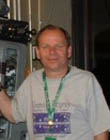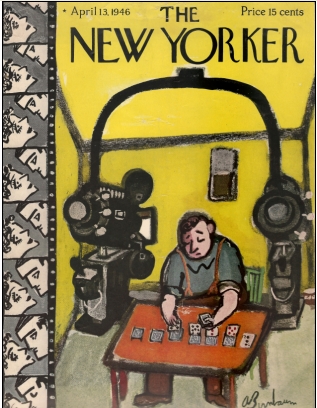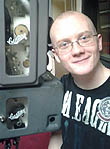|
|
This topic comprises 2 pages: 1 2
|
|
Author
|
Topic: Getting into projection
|
|
|
|
|
|
|
|
|
Leo Enticknap
Film God

Posts: 7474
From: Loma Linda, CA
Registered: Jul 2000
|
 posted 01-04-2018 10:42 PM
posted 01-04-2018 10:42 PM





There are almost no projectionists left if you define a projectionist as someone employed by an individual theater to be responsible solely for the technical presentation of movies.
In the mainstream theater industry at least, the job role has largely been replaced by that of the service tech, since the conversion to digital. The everyday process is now almost entirely automated, with the only tasks done by a human operator being to ingest content (in most locations: in some it is delivered automatically online or by satellite, and this will likely increase) and build playlists (sequences of ads, previews, snipes, the feature, etc.) and schedules. Typically, both are done by the site managers.
However, the equipment in the booth needs installing, maintaining and fixing, and that is what service techs do. The balance between what is done by theater staff and what is done by a visiting tech varies from theater to theater. Some sites have theater staff that can do first line maintenance such as filter and bulb swapouts. Others have a visiting tech do everything that involves setting foot in the booth. The larger chains hire and train their own techs, while smaller ones and indies will often have a service contract with a third party service and support vendor. These vendors can range from quite large companies, to sole trading freelancers.
Remote monitoring and support is a major part of it, too. Some sites will have SNMP or other systems set up to "phone home" to a network operations center and automatically alert the duty tech that a bulb is approaching the end of its warranty life, or the light engine in Screen 4 at a 'plex 1,500 miles away is getting too hot. If the fix does require a tech callout to the site, the remote aspect will enable him or her to be sure to show up with all the parts and tools needed. As an example, I diagnosed a failed liquid cooling pump in a Barco earlier this week, by downloading a log from the projector remotely. When my co-worker went out there, he took a pump and a coolant flush kit with him, and so a repair that might have taken two visits in the old days only took one this time.
This is a very different job to that of an old school projectionist. Advanced IT skills (especially in setting up and configuring IP local area networks) are needed, as is knowledge of audio systems, but less, though some, electronics and mechanics. I get the impression that a significant number of techs come directly to the job from outside the movie industry, now; probably because now there are no more projectionists, the traditional career development route from projectionist to service tech has disappeared with them. One of the people I was at Barco school with had recently been hired from the IT department at a bank by a big theater chain, so she was very comfortable with the computing (and DCI security) aspects of the job, but had never heard the terms "flat" and "scope" before!
As you'll see from the job ads posted on this site, digital cinema service techs are in demand, and I'd have thought that somebody who is strong in at least one of the core skill sets would have a good shot at them.
Oh, and the working hours are very different from those of a traditional projectionist, too. A typical working day for me consists of a service call starting at 6am, with the aim of getting finished by around noon, and the first show of the day; the exact opposite of an old school projectionist, who would typically work from late morning to late evening. All bets are off when dealing with sudden breakdowns, though.
| IP: Logged
|
|
|
|
|
|
Jim Cassedy
Phenomenal Film Handler

Posts: 1661
From: San Francisco, CA
Registered: Dec 2006
|
 posted 01-05-2018 02:31 PM
posted 01-05-2018 02:31 PM




quote: Randy Stankey
There arenít any projectionists anymore
I agree that in this age of mindless multiplexes, the term "projectionst"
has largely disappeared as a unique job description at most venues.
On the other hand, I'm doing quite well at it, working not
so much for the usual "public" venues, but at several private
screening & preview rooms, and at several film festivals, both
locally and out of town.
I have no shortage of work, and at times I'm actually over-booked,
and at certain times of the year I can sometimes find myself working
7 days a week. (But as much as I enjoy what I do, even < I > need
to take an occasional "mental health break" !)
And when I work, I WORK! Most of the venues I work at are not set
up with any kind of automation. If I'm running film, it's usually change
overs. And sometimes I'm also handling microphones & lights. (manually)
When I'm not booked up with screening room jobs (which happens rarely)
I'm registered with the local stagehands union and I get sent out to work
large screen projection at corporate events & trade shows at the convention
center or one of the big hotels in town.
I like not being 'stuck' working at one job or venue. Every job, especially
the live shows, comes with its' own set of problems to solve, and I enjoy
the challenge. In fact, the more difficult the job, the more "fun" I have.
Hours and work days can be long and unpredictable. For example I was
planning on not working this Sunday, but yesterday morning around 5am,
I started getting 'urgent' text messages and e-mails to run a show early
Sunday morning for some director flying up from LA who wants to preview
his film it some industry people up here in San Francisco. So much for
sleeping in this weekend!
As to how to get started in "the business", things were a lot different
now than when I first started doing this stuff in the early 1970's.
Back then, least in New York where I was living at the time, you HAD to be
in the union to do projection work. When I became interested in this stuff,
I was constantly told that unless I had a relative "in the business" getting
a union card was almost impossible.
But through persistence and getting to know some people, I eventually
got a break. (Note: when going this route, there's a fine line between
being "persistent" and being a "pain in the ass".)
Through hard work, establishing a good reputation for reliability and being
resourceful at solving technical problems on the fly, and sometimes just
being in the right place at the right time, I managed to get to where I'm
at today.
Yes, there were few years in the 1980s & 90's where I worked as an engineer
or production assistant in the television business. I was also an assistant
cameraman on several low budget theatrical films (that actually got released)
or were on HBO) and I even worked for awhile as a video & cellular network
engineer for ATT.
But about 10 years ago, as phone companies merged & downsized & I knew my
job was most likely on the chopping block, I managed ( by being in the right
place at the right time) to get back into projection & presentation, and have
been doing it continuously ever since. And I'll probably do it till the day I drop.
. . and I'm OK with that. So go ahead- - call me a "projectionist" I won't mind.
It's what I do.
- - - - - - - It's who I am.

| IP: Logged
|
|
|
|
William Kucharski
Expert Film Handler
Posts: 244
From: Louisville, Colorado, United States of America
Registered: Oct 2012
|
 posted 01-05-2018 04:05 PM
posted 01-05-2018 04:05 PM




quote: Leo Enticknap
In the mainstream theater industry at least, the job role has largely been replaced by that of the service tech, since the conversion to digital. The everyday process is now almost entirely automated, with the only tasks done by a human operator being to ingest content (in most locations: in some it is delivered automatically online or by satellite, and this will likely increase) and build playlists (sequences of ads, previews, snipes, the feature, etc.) and schedules. Typically, both are done by the site managers.
Thanks, that's kind of what I was looking for.
He's got a LOT of experience in the computer field but would enjoy repair/diagnosis and even pseudo-mindless tasks like ingest and bugging Deluxe for the keys and turning the volume on the processors back up to something approximating the levels they are supposed to be set at when he leaves. :-)
Real projectionists, like those who ran the 70mm Dunkirk shows at most venues this summer, have my greatest respect.
| IP: Logged
|
|
Monte L Fullmer
Film God

Posts: 8367
From: Nampa, Idaho, USA
Registered: Nov 2004
|
 posted 01-05-2018 05:54 PM
posted 01-05-2018 05:54 PM




quote: William Kucharski
Real projectionists, like those who ran the 70mm Dunkirk shows at most venues this summer, have my greatest respect.
Actually, a Real projectionist is the fellow who ran carbon arc changeover houses, dealing with Nitrate film, is the in-house mechanic who knew how to make something work out of nothing just to keep the screen lit along with picture and sound, so to baffle the public on the magic shows we put on where they think we use videotape or optical discs for the content.
Where I'm at, I'm one of the Ast Mgrs, but also more the location projectionist/techncian since I progressed from film to digital and learning as I move forward within this industry.
| IP: Logged
|
|
|
|
|
|
|
|
|
|
|
|
All times are Central (GMT -6:00)
|
This topic comprises 2 pages: 1 2
|
Powered by Infopop Corporation
UBB.classicTM
6.3.1.2
The Film-Tech Forums are designed for various members related to the cinema industry to express their opinions, viewpoints and testimonials on various products, services and events based upon speculation, personal knowledge and factual information through use, therefore all views represented here allow no liability upon the publishers of this web site and the owners of said views assume no liability for any ill will resulting from these postings. The posts made here are for educational as well as entertainment purposes and as such anyone viewing this portion of the website must accept these views as statements of the author of that opinion
and agrees to release the authors from any and all liability.
|

 Home
Home
 Products
Products
 Store
Store
 Forum
Forum
 Warehouse
Warehouse
 Contact Us
Contact Us




 Printer-friendly view of this topic
Printer-friendly view of this topic






![[thumbsdown]](graemlins/thumbsdown.gif)






![[beer]](graemlins/beer.gif)






